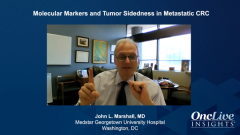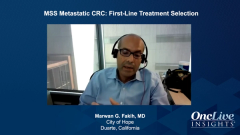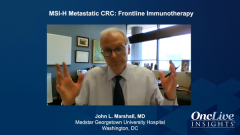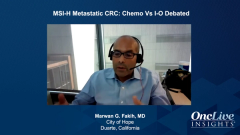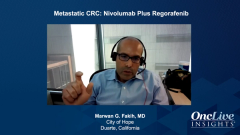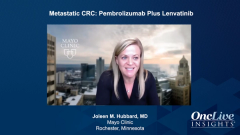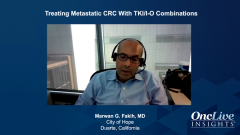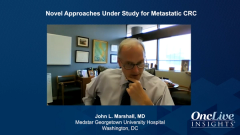
MSS Metastatic CRC: First-Line Treatment Selection
Tumor characteristics, patient factors, and supporting data that affect frontline treatment decisions for patients with microsatellite stable (MSS) metastatic colorectal cancer.
Episodes in this series

John L. Marshall, MD: Marwan, take us through your thinking about a brand-new case of metastatic colon cancer. What things do you integrate in terms of decision making for frontline treatment? And let me make this a patient with microsatellite stable (MSS) metastatic colorectal cancer.
Marwan G. Fakih, MD: Sure. I think the first thing to think about is, what's the goal of treatment. Is it curative intent or prolongation of survival? That really brings up the question of downstaging and how much you want to focus on a regimen that has a higher response rate, such as FOLFOXIRI [folinic acid, 5-fluorouracil and irinotecan], for example, for both left- and right-sided tumors. We know that regimen is associated with a higher response rate, and higher resectability based on the OLIVIA trial.
Secondly, an anti–EGFR-based therapy for RAS wild-type, BRAF wild-type, left-sided colon cancer gives you about a 20% response rate. So if the goal is really resection, or conversion through resection, certainly it's going to have to be FOLFOXIRI based.
Obviously, we have to take it into context of the patient, the performance status as well. Not everybody can tolerate FOLFOXIRI. And so, eligible patients have to be ECOG 0 or ECOG 1. They should be a bit younger—less than age 70 if we want to use that.
Molecular profiling and knowing which side the tumor is on are musts. Is it a left-sided tumor? What is the RAS status? What is the BRAF status? We said it's MSS. HER2 status is important. I don't think it's at the point where I'm implementing anti-HER2 therapy as first-line treatment yet, but I think that's a consideration. So those are the things to take into consideration.
Obviously, for an elderly, frail patient, I want to focus more on bevacizumab/capecitabine or bevacizumab/5-FU. I don't want to really burn those patients out, and these treatments may lead to severe toxicities. Those are pretty much the pillars of the decision-making process for my patients.
If it's not resectable, never resectable, then I'm going to be thinking about sequential therapies. For a left-sided RAS wild-type, BRAF wild-type tumor, I'd still consider anti-EGFR therapy based on the trend toward overall survival or improvement in the left-sided population versus bevacizumab, or based on the CALGB 80405 and FIRE-3 trials. For right-sided tumors, I'm avoiding anti-EGFR therapy.
Transcript Edited for Clarity


